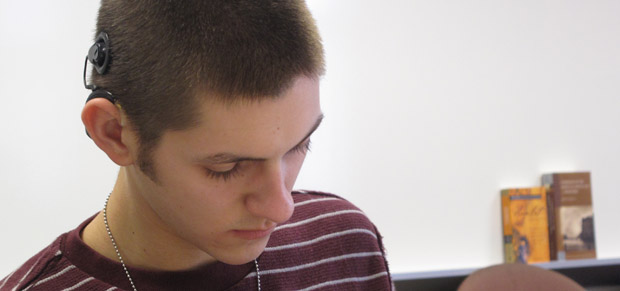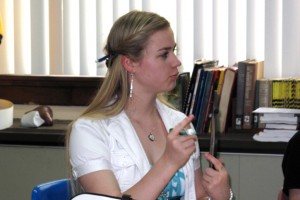How Indiana Took Sides In A Debate Over Deaf Schools

Gretchen Frazee / WFIU
Grant Phillips, who is completely deaf, attends Covenant Christian High School in Indianapolis. Phillips has had a cochlear implant since he was 16 months old, which allows him to hear. The device's use has been controversial within the deaf community.
Reported by Gretchen Frazee
Members of the deaf community have long debated whether deaf students should use medical hearing devices and be mainstreamed into the hearing culture, or whether they should be enrolled in schools that provide a more specialized education and promote the use of sign language.
In Indiana, that debate has come to a head in public schools serving the state’s hearing-impaired students.
The state is starting to pull resources away from the Indiana School for the Deaf, known as the ISD, because some say the school is too biased toward sign language.
- 'Auditory Learners'? Indiana's Deaf Ed DilemmaWFIU’s Gretchen Frazee reports for StateImpact Indiana on how a debate over cochlear implants affects state education policy.Download
A bill that recently passed the Indiana legislature moves the Indiana School for the Deaf’s outreach services to a new center for deaf and hard of hearing education. This means students will receive assessments and other assistance from a new center for deaf and hard of hearing education.
—Dr. Richard Miyamoto, former Indiana School for the Deaf board member
As medical devices become more advanced, the debate between oral communication and sign language has become more heated. Lawmakers said the ISD was not giving students enough experience in the hearing culture through the use of cochlear implants. (The devices electrically stimulate nerves in the inner ear, allowing deaf individuals to hear.)
But the school’s administrators say this isn’t true. ISD superintendent David Geeslin says the school’s outreach services assess each child individually and provide parents with all the possible options.
“Unfortunately there is not an easy litmus test where we can just determine what method the child needs to be instructed through,” Geeslin says. “It would be nice if it were that simple that we could just use that litmus test and know if that student was going to be a visual or auditory learner. But it’s all about trial and experiences quite honestly.”
Dr. Richard Miyamoto, a former Indiana School for the Deaf board member, was in charge of the first Federal Drug Administration’s trials of cochlear implants. While he says he understands the ISD’s stance in the debate, Miyamoto says about 90 percent of deaf children are born to hearing parents.
“Most [parents] aren’t very good at signing because it’s a second language they aren’t proficient in so it’s a real effort to learn this,” Miyamoto says, “so I think the first choice of many of these families is to get their child back into the hearing world if it’s possible.”
That causes parents to look at options other than sign language, Miyamoto adds. One of the best alternatives, so far, has been cochlear implants.
But many students can’t be mainstreamed because they have other learning disabilities or in Margaret Katter’s case, they aren’t candidates for implants. With autoimmune disease, the problem is between the cochlea and the brain, so cochlear implants don’t help.
Mainstreamed, With An Asterisk
Grant Phillips and three of his classmates are giving a presentation on Wuthering Heights to their literature class at Covenant Christian High School in Indianapolis.
—Margaret Katter, ISD student
Unlike his peers, Phillips is completely deaf, but you could hardly tell from listening to him and watching how he interacts with his friends. Since he was 16 months old, Phillips has had a cochlear implant — Dr. Miyamoto performed the procedure.
At the time of the surgery Phillips was the youngest child to undergo the procedure. He’s now 18. Phillips has been accepted to IUPUI and plans to go into public safety management.
“I’m going to go try and enroll in the law enforcement academy and work toward becoming a law enforcement officer, because I have to pass the physical and I don’t even know if they’ll let me do that yet, but hopefully I can pass that,” Phillips says.
‘Listening Is Work’
On the other side of town, Margaret Katter, sits in a classroom at the Indiana School for the Deaf or ISD. She and her classmates and teacher use sign language to communicate with each other.
Katter has autoimmune inner ear disease, a condition that progressively worsens. That means she can hear using a hearing aid, although some days are better than others.

Gretchen Frazee / WFIU
Margaret Katter participates in class at the Indiana School for the Deaf. Katter, who will graduate as the ISD's valedictorian this Spring, has an autoimmune disorder that adversely affects her hearing. She's not a candidate for cochlear implants, but Katter says she's glad she wasn't put in mainstream schools.
“Most of the time I speak with my family but in situations where the place is really noisy and I can’t really understand and I might be having kind of an off day with my hearing, then we transition into sign language,” Katter says.
Because of the nature of her condition, Katter isn’t a candidate for cochlear implants. When she was less than two years old, Katter’s parents decided to teach her sign language and put her in classes here at ISD where sign language is primarily used to communicate.
Katter is valedictorian and will graduate this year with college credits that she’s earned at a local public high school. And even though she could have been mainstreamed into public school like Phillips, Katter says she’s glad she wasn’t.
“Listening is work. It’s something extra that I have to do. And then when I’m sitting in class at the deaf school I don’t have to do that, I can just focus on learning and remembering what I’m learning in class,” Katter says.
Gretchen Frazee is a reporter and producer for Indiana Public Media.
Podcast: Play in new window | Download
